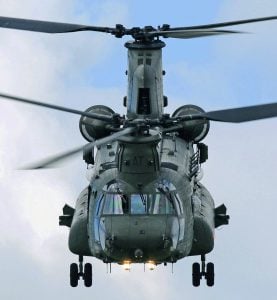New Citations | Combat Helicopters: Luxury Cars of the Sky
Recent psychophysiological studies feature BIOPAC’s MP Research series of Data Recorders and AcqKnowledge software.
Creating Adaptive Assistants for helicopter crews based on Real-time Physiological Data

Real-Time Psychological monitoring could assist service members during missions. PC: Thomas Burke
In the Mercedes S-Class, biometric tools track a driver’s eyes, heart rate, and other physiological data, with one goal in mind: Making sure drivers are alert and safe on the road. The car may provide helpful aids to the driver based on this data, such as a reminder to focus on the road, or to pull over for some coffee (yes, really… there’s a coffee icon that lights up on the dash!) For combat helicopter crews, the stakes of attentiveness become a more serious matter, and programmable aids based on real-time psychophysiological data streams could give pilots vital information on the well being of their crew, increasing effectiveness in the field. In a study testing the practicality of such devices, researchers tested helicopter crews in a simulated environment using BIOPAC MP160 Data Recorders.
Read the full study: An Exploratory Analysis of Physiological Data Aiming to Support an Assistant System for Helicopter Crews (Matthew Masters, Diana Donath, Axel Schulte)
Using fEMG to understand the communication of emotion
Current research into the study of emotion almost exclusively focuses on the interpretation of emotions by an observer, or in the autonomic reactions associated with an emotion. What is left relatively unstudied is the neural commands behind attempting to communicate an emotion to an observer, for example “Show me your war face!” This Stanford University study used BIOPAC MP-series Data Recorders and EMG100C-MRI amplifiers to track the movement of the zygomaticus major.
Read the full study: Neural correlates of communicating emotion through facial expressions: A simultaneous fMRI and facial EMG study (W. Craig Williams, Yuan Chang Leong, Eleanor A. Collier & Jamil Zaki)
Testing Cognitive Ability as pilots age
For subjects with high stress and high risk occupations, such as pilots, researchers wondered if the benefits of experience that come with age outweigh the cognitive declines of aging. This study measured oxyhemoglobin with an fNIR headband through several batteries of tests to track test performance as a function of cognition.
Read the full study: Influences of age, mental workload, and flight experience on cognitive performance and prefrontal activity in private pilots: a fNIRS study (Mickaël Causse, Zarrin K. Chua, & Florence Rémy)
Has your paper just been published outlining a study featuring BIOPAC technology?
Drop us a line to be featured in our monthly citation highlights!
Stay Connected